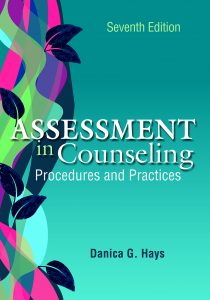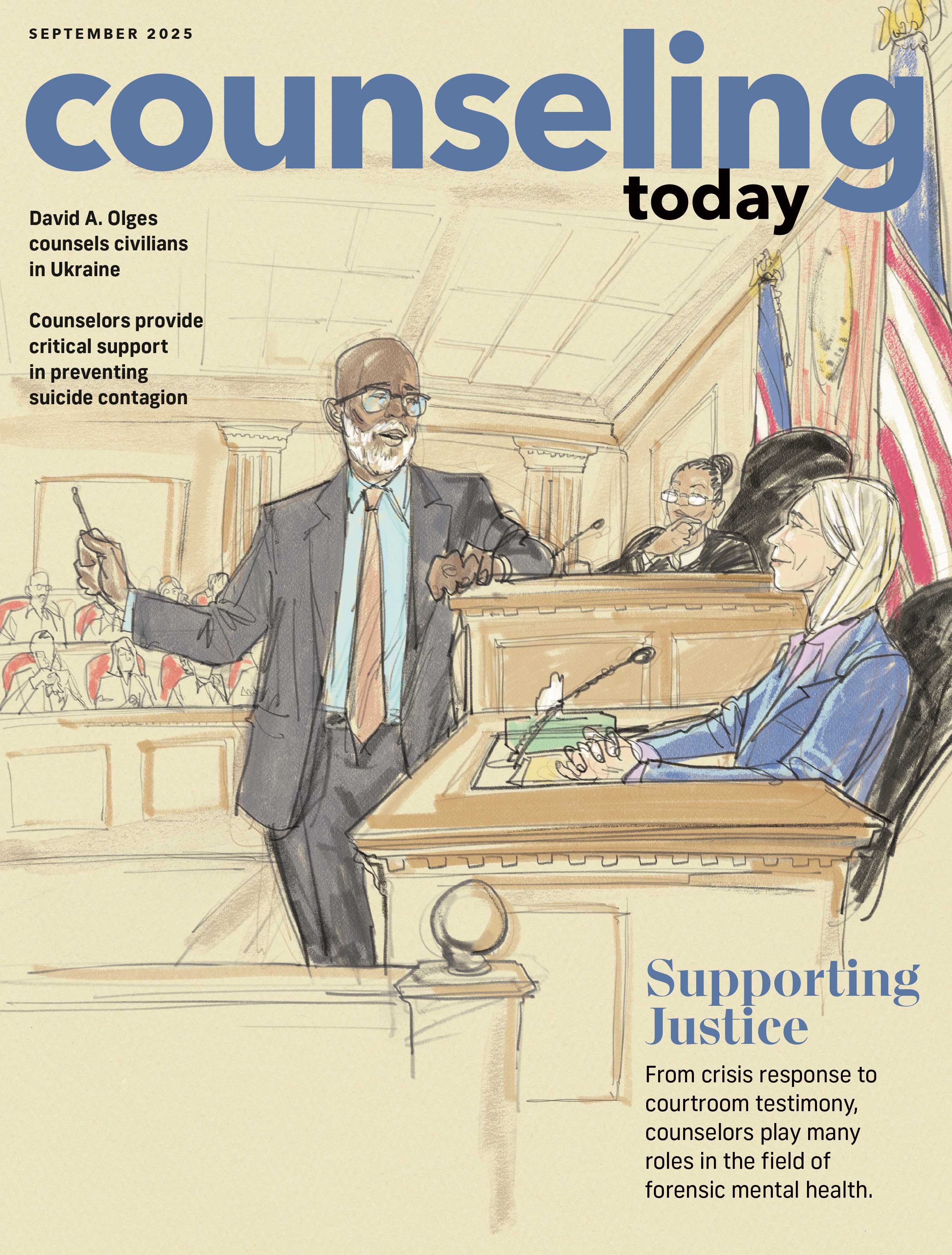Explore Counseling Today Articles
Behind the Book: Q&A with Danica G. Hays
ACA recently released the seventh edition of the best-selling book Assessment in Counseling: Procedures and Practices. This revised edition includes new and expanded content on assessment and qualitative and quantitative approaches that can be used in face-to-face and telehealth counseling settings. Counseling Today spoke to Danica G. Hays, a professor of counselor education and educational psychology and the dean of the College of Education at the University of Nevada, Las Vegas, about what inspired her to write the new edition and how the proper assessment of clients can help build the therapeutic alliance.
////
What is assessment in counseling?
In our profession, the term assessment is often erroneously used interchangeably with the term testing. When I began training and then working as a professional counselor, I learned quickly that assessment is so much more than testing. It is all the procedures and practices that occur informally and formally as the counselor and client engage in counseling. In addition, assessment is a tool for relationship building that can happen with both the client and their community. Essentially, assessment is counseling practice.
What prompted you to revise this book now and how does it differ from previous editions?
 I
am excited to have the seventh edition available to emerging and
seasoned counselors. In general, this text has been a part of my life
since I trained as a professional counselor and taught an assessment
course early in my career, using the third and fourth editions of the
text, respectively, co-authored by Albert B. Hood and Richard W.
Johnson. Hood and Johnson were instrumental to my own learning and
teaching. They provided such a strong foundation for the text, and I
remain humble to be able to author and revise the text’s fifth, sixth,
and now seventh editions.
I
am excited to have the seventh edition available to emerging and
seasoned counselors. In general, this text has been a part of my life
since I trained as a professional counselor and taught an assessment
course early in my career, using the third and fourth editions of the
text, respectively, co-authored by Albert B. Hood and Richard W.
Johnson. Hood and Johnson were instrumental to my own learning and
teaching. They provided such a strong foundation for the text, and I
remain humble to be able to author and revise the text’s fifth, sixth,
and now seventh editions.
The seventh edition emphasizes that assessment procedures and practices are integral components of counseling throughout the counseling relationship and that they can be culturally responsive to support client and community well-being. In addition, counselors will learn how qualitative and quantitative approaches can be used across in-person and telehealth counseling settings.
What are the benefits of engaging clients in the assessment process?
Because the assessment process is counseling practice, it is embedded in the work we do every day with our clients and communities. Thus, we engage in assessment procedures and practices in our work whether we recognize it or not. With this awareness, counselors can increase their knowledge of available assessment approaches and be intentional with their use throughout the counseling process to address presenting concerns and support overall wellness.
Assessment procedures and practices have several benefits. As a process within a counseling session, effective assessment processes can foster client self-awareness of both their challenges and their strengths and areas of resilience. They can facilitate the counseling relationship, which in turn can yield optimal outcomes for the client, such as wellness and self-empowerment. Furthermore, they can help to identify new ways of understanding mental health, resilience and social justice concerns experienced by culturally and linguistically diverse clients and communities.
Assessment processes can also extend outside of the traditional counseling session. For example, when counselors use assessment approaches such as community asset mapping or other social justice-oriented approaches, they better understand how communities can be assets for client well-being as well as their own professional and personal growth. Finally, knowledge gained from the assessment process can help inform counselors’ work with community stakeholders, other practitioners and policymakers, which ultimately advances counseling practice and our profession in general.
How has telehealth affected the way counselors assess clients?
A silver lining of the COVID-19 pandemic has been the increased use of telehealth, which allowed for cost-effective and accessible assessment processes to persist during social distancing. Before the pandemic, however, telehealth was an invaluable resource to reach clients who are traditionally underserved, such as those in rural settings, those with disabilities and those of other marginalized statuses.
Counselors who deliver telehealth assessment and counseling have a wide array of technologies available to them: telephone or video calls to provide services synchronously, wearable devices, text-based mobile health interventions, chatbots and e-consultations to support clients asynchronously. These technologies can increase access to the assessment process, but counselors also need to be sensitive to the fact that some clients may not be able to use telehealth because of a lack of access to technology or a general digital divide.
How does implicit bias affect mental health assessments?
We all have implicit bias — the attitudes and stereotypes we hold about ourselves and others — and it affects our personal and professional interactions every day. Implicit bias can be positive or negative and is based on our own cultural experiences. It can lead to discrimination or harmful behaviors based on negative attitudes held about a cultural group. Racism, sexism and other forms of discrimination (e.g., heterosexism, classism) occur in assessment when counselors use cultural group membership as the explanation for assessment findings. In other words, the counselor says that race or other cultural markers cause systemic differences, alluding to minority group membership as deficient in some manner.
The impact of implicit bias — through acts of discrimination — has sustaining effects that extend beyond an assessment finding. For example, research in school settings demonstrate that implicit bias can impact student learning, lead to improper placement in special education, yield harsher disciplinary actions (e.g., suspensions, expulsions), and cause general “adultification” of children that leads to insufficient support of their developmental, psychosocial and academic needs. In clinical settings, implicit bias has been connected to misdiagnosis, improper intervention use, inaccurate prognosis and underutilization of counseling services.
Thus, implicit bias can easily enter our work as counselors, affecting how we assess and intervene with clients, which has short- and long-term effects on clients’ psychological, social, academic and career outcomes, to name a few. I challenge emerging and seasoned counselors to reflect on their initial impressions of a client and where those impressions may originate. In addition, I encourage them to constantly seek information that may disconfirm those initial impressions. Professional development through ACA and consulting with peers invested in multicultural and social justice competency are invaluable supports for continued professional growth for addressing implicit bias.
What advice would you give to new counselors who may have doubts about their ability to accurately assess clients?
Assessment can be a scary verb! I encourage counselors to remember that assessment has several flexible procedures and practices that can include qualitative or quantitative features. Every counselor, whether emerging or seasoned, can learn new strategies for engaging in effective assessment.
Being able to effectively assess clients is part of your journey as a developing counselor. We are trained to be engaged with clients through foundational helping skills, such as active listening, conveying authenticity, unconditional positive regard and empathy. I recommend that counselors rely on these skills to develop a therapeutic alliance with clients. As the alliance is strengthened, the likelihood that clients will disclose clinically relevant information and gain self-awareness of their presenting concerns and strengths can advance the assessment process. In turn, the assessment process can strengthen the therapeutic alliance, but without establishing an initial counseling relationship, effective assessment cannot occur.
Throughout the book, I provide several tip sheets to support counselors as they consider a variety of assessment approaches as well as strategies to effectively implement those approaches. The book begins with foundational information about assessment and the initial counseling and assessment phase and then transitions to crisis and trauma assessment and assessment procedures and practices for more focused mental health, addictions, cognitive, academic, career, personality and interpersonal concerns.
How can counselors communicate clinical assessment results with clients?
Although communicating assessment findings is usually considered the last phase of the assessment process, effective communication starts at the beginning of counseling. I recommend that counselors discuss with their clients why various assessment approaches are selected, what uses the various approaches have, what their strengths and limitations are, what clients can expect in terms of how these approaches will be introduced and administered during counseling, and how various findings and scores are interpreted and what potential implications those have for the client. If counselors have done a good job of navigating their clients through these assessment process steps, communicating assessment findings will have a greater benefit to their clients.
 Order Assessment in Counseling: Procedures and Practices (seventh edition) from the ACA Store.
Order Assessment in Counseling: Procedures and Practices (seventh edition) from the ACA Store.
The views expressed in Counseling Today are those of the authors and contributors and may not reflect the official policies or positions of the editors or the American Counseling Association.
- Assessment, Diagnosis & Treatment
- Treatment & Intervention
Search CT Articles
Filter CT Articles
Current Issue
Sign Up for Updates
Keep up to date on the latest in counseling practice. Sign up to receive email updates from Counseling Today.



